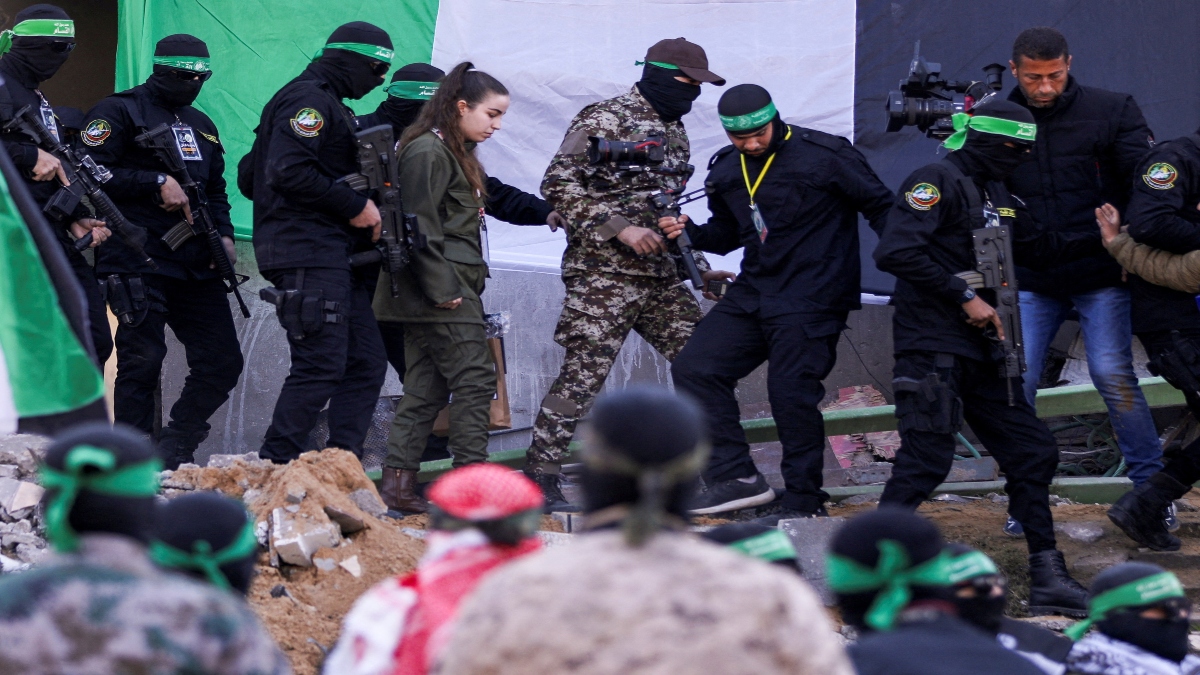Israel has halted the release of Palestinian security prisoners set to be freed after the return on Israeli hostages in protests against the scenes of chaos surrounding the release of Arbel Yehoud, Gadi Mozes, and five Thai nationals, according to a Times of Israel report, citing Channel 12.
A total of 110 Palestinian prisoners were expected to be freed on Thursday as part of the phased agreement that halted fighting in the shattered coastal territory earlier this month.
Buses carrying the detainees had been instructed to return to prisons in an apparent response to the chaotic handover, added the report.
Arbel Yehud, 29, was abducted from Kibbutz Nir Oz during the Hamas-led attack on Israel on October 7, 2023. In a tense moment in Khan Younis, she appeared fearful and struggled to navigate through a chaotic crowd as armed militants handed her over to the Red Cross.
Also released was Gadi Moses, 80, along with five Thai nationals who were working on Israeli farms near Gaza, according to the Israeli military.
Meanwhile, the mother of one of the Thai workers anxiously watched the livestream of the release from her home in northeastern Udon Thani province.
“Please, let my son walk out now, I want to see his face,” Reuters quoted Wiwwaro Sriaoun, 53, as saying as the footage on her phone showed a vehicle moving slowly through the crowd.
Israeli Prime Minister Benjamin Netanyahu slammed what he described as “shocking scenes” during the handover on Thursday.
“I view with great severity the shocking scenes during the release of our hostages. This is yet another proof of the unimaginable cruelty of the Hamas terrorist organisation,” AFP quoted Netanyahu as saying in a statement, after television images showed gunmen struggling to control hundreds of Gazans gathered to witness the handover.
Impact Shorts
More Shorts“I demand that the mediators ensure such horrific scenes do not recur and guarantee the safety of our hostages,” Netanyahu added.
Earlier, in Jabalia in northern Gaza, an Israeli soldier, Agam Berger, wearing an olive green uniform, was led through a narrow ally between heavily damaged buildings and over piles of rubble before being handed to the Red Cross.
“Our daughter is strong, faithful, and brave,” Reuters quoted her family as saying in a statement.
“Now Agam and our family can begin the healing process, but the recovery will not be complete until all the hostages return home.”
A video released by Netanyahu’s office showed a pale Berger crying and smiling while sitting on her mother’s lap.
Netanyahu has faced criticism in Israel for not having sealed a hostage deal earlier after the security failure that enabled the October 7 Hamas assault.
Hamas defiance
Hamas, which Israel has vowed to obliterate, still has a strong presence in Gaza despite heavy bombardment from the Middle East’s most advanced military over more than 15 months and the assassination of Hamas leader Yahya Al-Sinwar.
“The killing of leaders only makes the people stronger and more stubborn,” Reuters quoted senior Hamas official Sami Abu Zuhri as saying of Sinwar, filmed by an Israeli drone badly wounded throwing a piece of wood at the device in his final defiance of Israel.
The release in Khan Younis took place near the bombed ruins of Sinwar’s house.
The Palestinian prisoners, who include 30 minors and some convicted members of Palestinian groups responsible for deadly attacks that killed dozens of people in Israel, had been expected be taken to the West Bank or Gaza later in the day.
Israelis gathered in what has become known as Hostages Square in Tel Aviv, cheering and crying as they watched the release on a giant screen. The hostages will be taken to hospital for treatment.
Some people cheered as US President Donald Trump’s Middle East envoy Steve Witkoff arrived at the square, in apparent gratitude for his role in securing the ceasefire deal. He shook hands with some people, including family members of hostages.
Around 1,200 people were killed and more than 250 hostages were abducted in the Hamas attack in Israel, the bloodiest single attack on Jews since the Holocaust. Israel’s military response has killed more than 47,000 Palestinians and laid waste to the enclave of 2.3 million people, who face severe shortages of medicine, fuel and food.
Around half the hostages were released the following month during the only previous truce, and others have been recovered dead or alive during Israel’s military campaign in Gaza.
Hundreds of thousands of Gazans, most displaced repeatedly during the conflict, have returned to their neighbourhoods in the north, where the fighting was most intense. Many have found their homes to be uninhabitable and basic goods in short supply.
Israel still lists 82 captives in Gaza, with around 30 declared dead in absentia.
In the course of the war triggered by the Hamas attack, Israel has killed other leaders of Hamas as well as Lebanon’s Hezbollah, striking major blows against Iran’s network of proxies in the Middle East. The fall of Iran-backed Syrian president Bashar al-Assad was also a boost for Israel.
Israeli forces have stepped up operations in another Palestinian territory, the West Bank, since the Gaza ceasefire came into effect, saying they are targeting militants there.
With inputs from agencies


)

)
)
)
)
)
)
)
)



